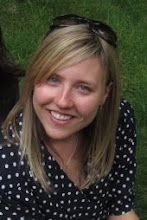I can't reveal much of what happens during YMBBT (if I hadn't already been unlikely to do so, the news of a fellow critic having his knuckles rapped by one of the performers for saying too much would have persuaded me), so I'll limit my comments to discussing my own response to the work.
Despite the fact that many of the situations I was thrown into were unfamiliar and potentially discombobulating, the total commitment of the piece made it easy to respond in a way that was both enjoyable and enlightening (for me - I don't profess to have enlightened anyone else). I was surrounded by physical environments and characters that gave me a solid framework within which to respond in the way that I chose. There was freedom, but not too much, because although I was acting (or, rather, reacting) in this show, I was, in the end, a mere visitor, and the distinction between my role and that of the performers was maintained throughout. In our interview, Kate Bond called the show a "massive surprise party" and I can't think of a better way to describe the roles we all played and the joy that I felt to be the recipient of the surprise.
Having had such a lovely time at YMBBT, I was rather excited to be offered the chance to take part in further solo theatre experiences, at BAC's One-on-One Festival. Thirty-odd British and international artists are taking part in One-on-One and each ticket guarantees entry to at least three shows. On the afternoon I went, I managed to squeeze in five shows and could have seen a couple more if I'd been paying more attention (it was hot, I was sleepy and at one stage in the afternoon I received a fairly large electric shock – more on that later – so perhaps wasn't at my most professional). With tickets starting at £17.50, that's not a bad deal.
I found the festival's setup engaging: you're given a guide, a map and an individualised timetable to follow and you're then free to wander about poking your nose into things and generally soaking up the atmosphere. The BAC is always a jolly place to hang out and the shared sense of anticipation buzzing in the air made it even more so.
The problem came with the shows themselves. I felt the same sensation to varying degrees with each one that I saw: the absence of supporting cast or committed physical context meant that I was required to make real leaps if I wanted the show to go on. The fact that I was interacting with just one other person made each show much more dependent on my making the right choices at the right moment. I was a performer, but one without the benefit of a script, direction, experience or training. Unsurprisingly, given these circumstances, my performance was poor. I don't generally enjoy plays where the star is no good and it was no different when that star was me.
In Internal, the 2009 Fringe First-winning show from Belgian company, Ontroerend Goed, I was paired up with a charming curly-haired performer, then asked to whisper to a group of similarly paired up audience members and performers what I thought of him. The show's loosely established speed-dating scenario sought to guide me and the other audience members to some verbal confession or physical manifestation of romance, but, steered too lightly to be able to lose myself in the moment and respond naturally (as in YMBBT), I remained self-aware and uncomfortable. I can't speak for others in the group, but they looked pretty uncomfortable too from where I was sitting.
The clearer the role I was given the more I enjoyed the show. In Kneehigh's Wonder Nurse, as in Ray Lee's Electric (the show responsible for my mid-afternoon electric shock), for example, the series of quasi-medical questions provided a framework for my responses, taking some of the agency out of my role and thereby allowing me to sit back and find amusement in the characterisation and storytelling laid on for me.
I understand that part of the point of all this work is to make the solo audience member feel uncomfortable and to question their responses to certain situations or personalities, but it was never made clear why this was the intended result. I enjoyed aspects of several of the shows I saw at One-on-One, but I didn't feel that I was taking part in any great art or being made to ask questions of myself that I don't already ask.
I could probably go on about this for ages, but I've got to drive to Latitude Festival now – from where I'll be blogging for Whatsonstage.com – so I'll have to draw to a close. Lots of other people I know really loved One-on-One, so maybe it's just me. I'd be interested to know your thoughts.
